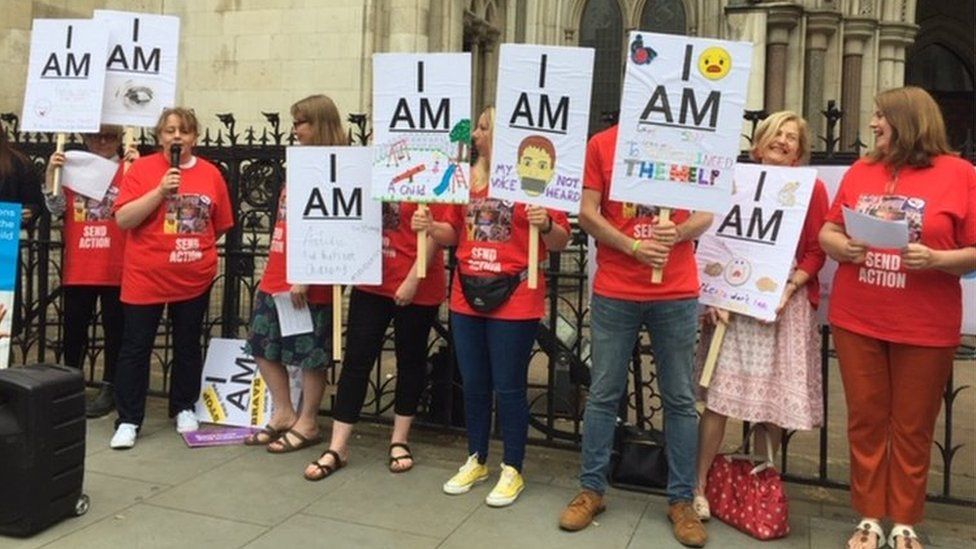Families take government to court over special needs
- Published

Families are mounting a High Court challenge to the government's funding of support for children with special educational needs and disabilities.
Their lawyers will argue the government is leaving councils in England unable to fulfil their legal duties to give these children the support they need.
Judges will have to decide whether Send funding decisions have been lawful and may order a government rethink.
The government said it was investing significantly into high needs budgets.
Outside the Royal Courts of Justice in London, parents of children with special needs made a series of emotional pleas for the government to listen.
There was talk of futures being stolen and lives wasted as young people fell through cracks in the system.
'Exhausting fight'
Lorraine Heugh, mother of 15-year-old Nico Heugh Simone from East Sussex, a party in the case who has autism, anxiety and other related conditions, said: "No longer can we stand by and watch our children be overlooked and denied the support they need.
"This is about children's human rights which are being taken away - and something has to change."
Mary Riddell, mother of Dakota, nine, who has cerebral palsy and other disorders, spoke of how her family has had to fight for every single piece of extra support.
"Nothing prepares you for the sheer enormity of the battle.... The fight is real, exhausting and mind-blowing," she told nodding supporters.
Families of children with extra learning needs have long had to fight for support, but campaigners say the situation has become a national crisis.
Austerity budgets and changes to the system, in 2014, have meant the huge increase in demand for support has not been matched with an associated rise in funding.
In the past financial year, eight out of 10 councils in England spent more than their allocated budgets for high needs, a BBC News investigation found.
And school leaders have complained their school budgets are being used to plug gaps in special needs funding.
Part of the issue has been the fact that, in 2014, councils were given the additional responsibility for young people with special needs up to the age of 25. Previously the responsibility stopped at 18.
This, and other pressures, have meant the number of pupils with special needs grew by more than half between 2014 and 2018.
Solicitor Anne-Marie Irwin, of public law specialists Irwin Mitchell, said this was the first time the government had been taken to court over its special needs funding decisions, although two local authorities have faced High Court challenges.
Specifically, the court is being asked to rule whether last autumn's Budget was set lawfully.
'Typical stories'
Three families with children with special needs, from Birmingham, North Yorkshire and East Sussex, are fighting the case. They are all being supported by campaign network Send Action.
Their lawyers say their stories are typical of the many families around the country who are struggling to access the services their children need to support their education and learning.
Another teenager, whose case will be heard by a High Court judge, is Benedict McFiggan, 14, from Scarborough, North Yorkshire, who has struggled to access support for mental health issues - post-traumatic stress disorder, anxiety, depression and chronic insomnia.
'Held to account'
North Yorkshire County Council initially refused to give him an official assessment of his needs, known as an education and health care assessment.
He has not been in mainstream school for nearly two years and now attends a pupil referral unit, but for fewer than three hours a day.
His mother, Kirsty, 40, said so many councils were struggling and she was shocked at the lack of government action.
"We feel this issue is being caused at the top and are determined to ensure the government is held to account on sorting it out."
Analysis by education editor Branwen Jeffreys
Five years ago parents whose children had disabilities or special needs were hopeful.
Now they're protesting outside the High Court as their case against the government begins. So what happened?
In 2014 big changes swept aside the old system of statements and brought in education and health care plans.
These set out the needs of children with the most severe or complex special needs and disabilities.
For the first time, there was a legal right to support up to the age of 25.
That might mean help with coping with the challenges of an autism spectrum disorder or a physical disability requiring assisted technology.
That was celebrated as making it more possible for young people to go to college, training or university and live independently.
It also massively increased the bill for councils who have the legal duty to meet those needs.
Now in an unprecedented court case, parents are taking on the government.
At its heart is the dispute about whether ministers failed to adequately fund the reforms they introduced.
A Department for Education official said: "The government's ambition for children with special educational needs and disabilities is no different to any other child - we want them to enjoy school and achieve to their full potential.
"This is why we are investing significant funding into supporting those with more complex special educational needs - high needs funding totalling £6.3bn this year.
"It would be inappropriate to comment further until the judicial process has concluded."
The hearing is scheduled to last two days with a judgement being delivered at a later date.
- Published15 April 2019
- Published4 December 2018
- Published30 May 2019
- Published30 January 2019